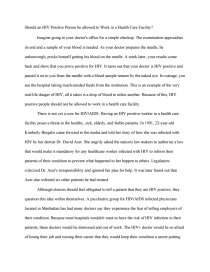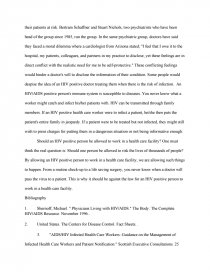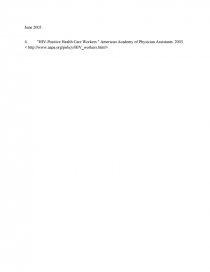Should an Hiv Positive Person Be Allowed to Work in a Healthcare Facility?
Essay by review • February 7, 2011 • Research Paper • 703 Words (3 Pages) • 1,394 Views
Essay Preview: Should an Hiv Positive Person Be Allowed to Work in a Healthcare Facility?
Should an HIV Positive Person be allowed to Work in a Health Care Facility?
Imagine going to your doctor's office for a simple checkup. The examination approaches its end and a sample of your blood is needed. As your doctor prepares the needle, he unknowingly pricks himself getting his blood on the needle. A week later, your results come back and show that you prove positive for HIV. It turns out that your doctor is HIV positive and passed it on to you from the needle with a blood sample unseen by the naked eye. In outrage, you sue the hospital taking much-needed funds from the institution. This is an example of the very real-life danger of HIV; all it takes is a drop of blood to infect another. Because of this, HIV positive people should not be allowed to work in a health care facility.
There is not yet a cure for HIV/AIDS. Having an HIV positive worker in a health care facility poses a threat to the healthy, sick, elderly, and feeble patients. In 1991, 22-year-old Kimberly Bergalis came forward to the media and told her story of how she was infected with HIV by her dentist Dr. David Acer. She angrily asked the nation's law makers to authorize a law that would make it mandatory for any healthcare worker infected with HIV to inform their patients of their condition to prevent what happened to her happen to others. Legislators criticized Dr. Acer's irresponsibility and ignored her plea for help. It was later found out that Acer also infected six other patients he had treated.
Although doctors should feel obligated to tell a patient that they are HIV positive, they question this idea within themselves. A psychiatric group for HIV/AIDS infected physicians located in Manhattan has had many doctors say they experience the fear of telling employers of their condition. Because most hospitals wouldn't want to have the risk of HIV infection in their patients, these doctors would be dismissed and out of work. The HIV+ doctor would be so afraid of losing their job and ruining their career that they would keep their condition a secret putting their patients at risk. Bertram Schaffner and Stuart Nichols, two psychiatrists who have been head of the group since 1985, run the group. In the same psychiatric group, doctors have said they faced a moral dilemma where a cardiologist from Arizona stated; "I feel that I owe it to the hospital, my patients, colleagues, and partners in my practice to disclose, yet these feelings are in direct conflict with the realistic need for me to be self-protective." These conflicting feelings would hinder a doctor's will to disclose the information of their condition. Some people
...
...


